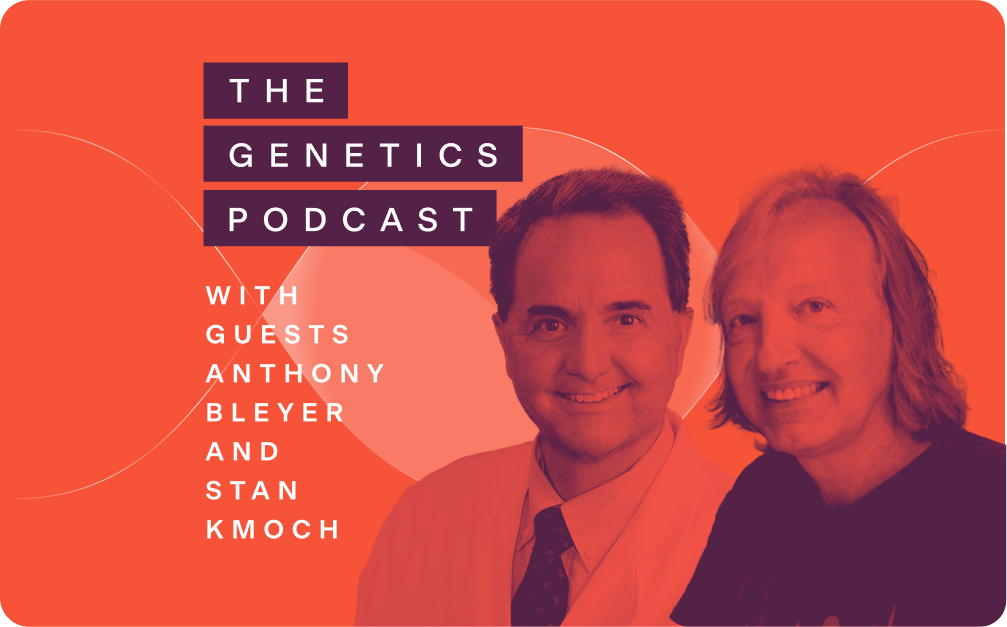Podcast recap: Anthony Bleyer and Stan Kmoch on hunting rare kidney disease mutations

In the most recent episode of The Genetics Podcast, Patrick Short sits down with Dr. Anthony Bleyer, Professor of Medicine at Wake Forest University, and Stan Kmoch, head of the National Infrastructure for Medical Genomics in the Czech Republic. This conversation is especially personal for Patrick, as both guests played a crucial role in identifying the genetic cause of kidney disease in his own family. They discuss their work in inherited kidney diseases, the challenges of genetic diagnosis, and the future of treatment, including the exciting potential of xenotransplantation.
Cracking the code of inherited kidney disease
Anthony’s journey into genetic kidney disease research began in 1996 when he encountered a family with an unusual inherited form of kidney disease paired with gout. From there, a collaboration with geneticist Tom Hart led to the discovery of a mutation in the UMOD gene, which encodes uromodulin, the most common protein excreted in urine. This breakthrough set the stage for Dr. Bleyer’s career as a rare disease clinical champion, connecting with families across the world to study genetic kidney disorders.
As his work expanded, Dr. Bleyer identified additional families whose disease could not be explained by UMOD mutations. Through a collaboration with Dr. Eric Lander at the Broad Institute, a second key gene, MUC1, was identified, though standard sequencing methods could not easily detect its mutations. Despite this breakthrough, many families still remained without a diagnosis. To broaden the search for new genetic causes, Dr. Bleyer partnered with Stan Kmoch, whose team in Prague specializes in both advanced genomic analysis and molecular biology.
A transatlantic collaboration in rare disease research
Prof. Kmoch’s team in Prague has long been a leader in genomic research, including metabolic disorders, peroxisomal diseases, and now nephrology. With expertise in sequencing, bioinformatics, and molecular biology, his lab became the perfect match for Dr. Bleyer’s clinical expertise. Together, they have uncovered multiple novel genetic causes of kidney disease, including their most recent discovery: mutations in APOA4.
The discovery of APOA4 as a cause of kidney disease
For years, Dr. Bleyer had collected samples from families with inherited kidney disease that did not fit the known genetic causes. Finally, in 2023, the collaboration between Wake Forest and the team in Prague led to the identification of APOA4 mutations as a novel cause of kidney disease – including the one that runs in Patrick's family.
- APOA4 is a protein that is primarily produced in the intestines and plays a role in fat metabolism.
- Patients with the identified mutations had progressive kidney disease due to amyloid deposits forming in the kidney’s medulla.
- A key breakthrough came when kidney biopsies were taken from the medulla rather than the cortex, revealing APOA4 deposits.
- The discovery was confirmed by finding the same rare mutation in multiple families and demonstrating that only the mutated form of APOA4 aggregated into amyloid.
This finding provides a new understanding of kidney disease and opens the door for new potential treatments. For now, research is exploring dietary modifications (such as low-fat diets), RNA-based therapies, and small molecule inhibitors to prevent APOA4 aggregation.
The power of patient-led discovery
One of the most important aspects of this research is the vital role patient families play in driving discoveries. Many referrals to Dr. Bleyer’s program come directly from patients determined to find answers. As seen with the discovery of APOA4, these families often spend years searching for a diagnosis, and their persistence is key to uncovering new genetic insights.
Dr. Bleyer talks about the importance of "rare disease champions": clinicians and researchers who dedicate their careers to identifying and understanding conditions that might otherwise go unnoticed. Thanks to their commitment, progress keeps moving forward, and more patients get the answers they've been waiting for.
The future of genetic kidney disease research
Beyond gene discovery, Dr. Bleyer and Prof. Kmoch are exploring other areas in kidney disease research, including:
- Mitochondrial DNA mutations as a hidden cause of late-onset kidney disease.
- Expanding international collaborations to identify more rare disease genes through shared genomic databases.
- Developing new treatment strategies, including gene editing, RNA therapies, and targeted drug development.
- The potential of xenotransplantation, particularly the use of genetically modified pig kidneys, to address the growing demand for organ transplants.
Final Thoughts
Dr. Bleyer and Prof. Kmoch are believers in – and proof of – the benefits of collaboration in rare disease research, whether it’s identifying more APOA4 families, developing new treatment strategies, or contributing to the broader understanding of inherited kidney diseases. They encourage clinicians, geneticists, and industry experts to reach out and work together because progress in this field depends on teamwork.
The work of Dr. Bleyer, Prof. Kmoch, and their teams is not only deepening our understanding of genetic kidney diseases but also driving change towards better diagnostics and new treatments, offering hope to families who have spent years searching for answers.
Listen now:
